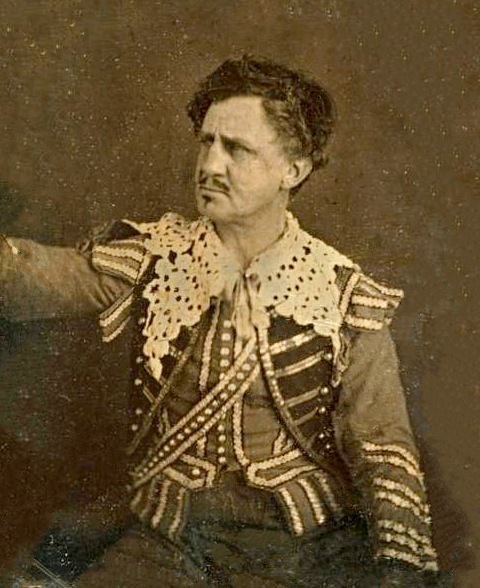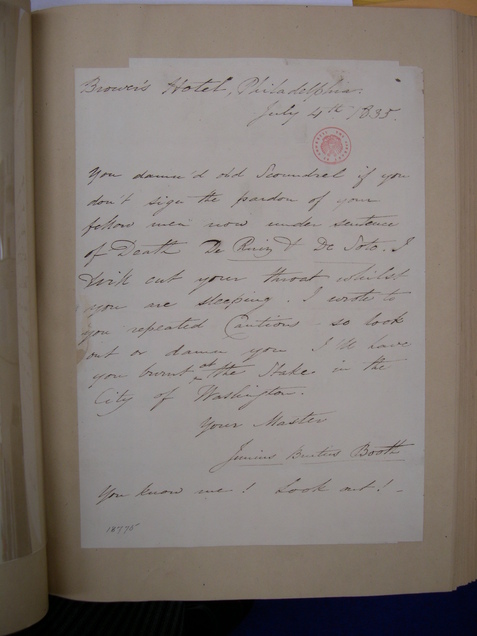I. Names (and the family enviroment)
It seems most appropriate to begin with Shakespeare. While quotes such as -
"What’s in a name? That which we call a rose / By any other name would smell as sweet." (Romeo and Juliet, II.ii.46-47)
or the perhaps more relevant -
“'Brutus' and 'Caesar'—what should be in that 'Caesar'? / Why should that name be sounded more than
yours? / Write them together, yours is as fair a name; / Sound them, it doth become the mouth as well." (Julius Caesar, I.ii.150-154)
seem to devalue the personal name's importance (and certainly a name is no indication of character), names are in actuality critical to the examination of the young John Wilkes Booth's environment.

Junius Brutus Booth, father of John Wilkes Booth
What Was Richard Thinking?
Richard Booth, the paternal grandfather of John Wilkes Booth, had a number of children with creative names (a theme that will be found throughout many generations of Booths). One of his sons was named Algernon Sydney[1], ostensibly for a man implicated in a plot to assassinate King Charles II. His more notable son, however, was Junius Brutus Booth - John Wilkes' father. This man also passed his name onto John Wilkes' brother, Junius Brutus Booth Jr. It is not entirely clear as to whom his name refers. There seem to be three possibilities.
I. The letters of Junius, written by an anonymous 'Junius' as criticism of King George III from 1769-1772.
II. Lucius Junius Brutus, the semi-mythological first consul of the Roman Republic who deposed the tyrant Tarquin.
III. Marcus Junius Brutus, the assassin of Julius Caesar.
To attempt to discern the origin of Junius Brutus Booth's name would be futile. All of these possibilities carry the same sentiment: that opposition - whether violent or otherwise - to the government can sometimes be justified or noble. We see this in Algernon Sydney Booth as well. To name one's children after these figures implies an admiration; the possibility of Richard's Brutus-admiration is mentioned in J. Ninian Beall's “Why Booth Killed Lincoln". There comes a point where we have to ask,
what in God's name was going on in this family?
Junius Brutus Booth, the Epistolary Menace
Junius Brutus Booth was known to struggle with alcoholism and be prone to violent, erratic outbursts. This upbringing certainly must have shaped John Wilkes in one way or another[2]. One interesting instance of this in Junius Brutus Booth's life was this lovely letter -

The letter reads "(Brown's Hotel, Philadelphia. July 4th, 1835.) You damn'd old Scoundrel if you don't sign the pardon of your fellow men now under sentence of Death De Ruiz + De Soto. I will cut your throat whilst you are sleeping. I wrote to you repeated Cautions - so look out or damn you I'll have you burnt at the stake in the City of Washington. Your Master Junius Brutus Booth. You know me! Look out!
This was a letter sent from Junius Brutus Booth[3] to President Andrew Jackson in 1835. It threatens Jackson's life in vivid detail, with the intention of having him free two men who were sentenced to death. Claims that Jackson and Booth were friends and that this letter was a joke seem to be unsubstantiated. Perhaps Booth really had some personal interest in these two men, or perhaps this was another bout of agitation. Either way, this paints an intriguing picture of the sort of person John Wilkes Booth's father was.
Conclusion
Richard Booth named his sons after political figures who advocated for extreme changes to their respective governments, sometimes through violent means. Junius Brutus Booth gave his own name to one of his sons, continuing this idea. Junius Brutus Booth, the father of John Wilkes Booth, wrote a letter threating President Andrew Jackson. I suggest that John Wilkes Booth grew up in an environment where this sort of revolutionary behaviour was approved of or admired. Make of all of that what you will.
Footnotes
[1] See Kauffman, Michael W. American Brutus: John Wilkes Booth and the Lincoln Conspiracies (2004) for the reference to Algernon Sydney Booth. It appears that he died young but was nonetheless given this name.
[2] For a further exploration of the effect Junius Brutus Booth had on his son's childhood, see Wilson, George W. “JOHN WILKES BOOTH: FATHER MURDERER.” American Imago, vol. 1, no. 3, 1940, pp. 49–60.
[3] This letter was formerly considered to be a hoax - id est not in fact being written by Junius Brutus Booth - but it was determined to be genuine by Daniel Feller.

